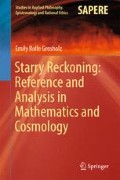Abstract
Productive mathematical and scientific research often takes place when more concrete discourse whose main intent is to establish and clarify reference is yoked with more abstract discourse whose main intent is analysis. The opposition between referential discourse and analytic discourse is explained by a detailed account of Leibniz’s notion of analysis as a search for the conditions of intelligibility of things, as well as the solvability of problems, in relation to his debates with Locke in the Nouveaux Essais, and then examining its continuation in the work of Ernst Cassirer. I argue that Cassirer tends to read the superposition of discourses too strongly as unification, as if the referential discourse disappeared entirely into the analytic discourse; to contest this reading, I tell a historical narrative about the investigation of the circle. The circle, like the cosmos, always has further surprises to reveal; its determinate oneness is never exhausted by an analytic discourse.
Access this chapter
Tax calculation will be finalised at checkout
Purchases are for personal use only
References
Azzouni, J. (2000). Knowledge and reference in empirical science. New York and London: Routledge.
Bertoloni-Meli, D. (2006). Thinking with objects: The transformation of mechanics in the seventeeth century. Baltimore: Johns Hopkins University Press.
Bos, H. J. M. (2013). Redefining geometrical exactness: Descartes’ transformation of the early modern concept of construction. Stuttgart: Springer.
Breger, H. (2016). Kontinuum, Analysis, Informales—Beiträge zur Mathematik und Philosophie von Leibniz. W. Li (Ed.). Berlin: Springer.
Cassirer, E. (1902). Leibniz’ System in seinem wissentschaftlichen Grundlagen. Marburg: N. G. Elwert’sche Verlagsbuchhandlung.
Cassirer, E. (1910/1980). Substanzbegriff und Funktionsbegriff: Untersuchungen über die Grundfragen der Erkenntniskritik. Berlin: Bruno Cassirer; repr. Darmstadt: Wissenschaftliche Buchgesellschaft.
Cassirer, E. (1923/1953). Substance and function and Einstein’s theory of relativity (W. C. Swabey & M. C. Swabey, Trans.). Chicago: Open Court.
Chasles, M. (1889). Aperçu historique sur l’origine et le développement des methods en géométrie. Paris: Gauthier-Villars.
Chemla, K. (1998). Lazare Carnot et la généralité en géométrie. In Revue d’histoire des mathématiques, IV, 163–190.
Daston, L., & Galison, P. (2010). Objectivity. Cambridge, MA: MIT Press.
Della Rocca, M. (2016). Meaning, the history of philosophy, and analytical philosophy: A Parmenidean ascent. In M. van Ackeren (Ed.), Philosophy and the Historical Perspective. Proceedings of the British Academy. Oxford: Oxford University Press. Forthcoming.
Euclid. (1956). Elements. T. L. Heath (Ed.). New York: Dover.
Grosholz, E. (2001). Theomorphic expression in Leibniz’s Discourse on Metaphysics. In G. H. R. Parkinson (Ed.), Studia Leibnitiana, thematic issue: Towards the Discourse on Metaphysics. Band 33, Heft 1, 4–18.
Grosholz, E. (2014). Leibniz, Locke and Cassirer: Abstraction and Analysis. In H. Breger & W. Chao (Eds.), Studia Leibnitiana, Special Issue on Analysis. Band 45, Heft 1, 97–108.
Grosholz, E., & Yakira, E. (1998). Leibniz’s science of the rational. Studia Leibniziana Sonderheft 26. Stuttgart: Steiner Verlag.
Kato, K., Saito, T., & Kurokawa, N. (1998). Number theory 2: Introduction to class field theory. Providence, RI: American Mathematical Society.
Klein, U., & Lefèvre, W. (2007). Materials in eighteenth-century science: A historical ontology. Cambridge, MA: MIT Press.
Lakatos, I. (1976). Proofs and refutations. Cambridge: Cambridge University Press.
Leibniz, G. W. (1962). Die Philosophischen Schriften (Vol. I–VII). C. I. Gerhardt (Ed.). Hildesheim: Georg Olms.
Leibniz, G. W. (1978). Mathmatischen Schriften (Vol. I–VII). C. I. Gerhardt (Ed.). Hildesheim: Georg Olms.
Leibniz, G. W. (1982). New essays on human understanding (P. Remnant & J. Bennett, Trans.). Cambridge: Cambridge University Press.
Leibniz, G. W. (1989). Philosophical essays (R. Ariew & D. Garber, Trans.). Indianapolis: Hackett.
Locke, J. (1959). An essay concerning human understanding (Vol. I–II). A. C. Fraser (Ed.). New York: Dover Publications.
Magnani, L. (2001). Philosophy and geometry: Theoretical and historical issues. Dordrecht: Kluwer.
Mazur, B. (2004). Imaginary numbers. New York: Picador.
Nahim, P. (2010). An imaginary tale. Princeton: Princeton University Press.
Netz, R. (2003). The shaping of deduction in Greek mathematics: A study in cognitive history. Cambridge: Cambridge University Press.
Rabouin, D. (2009). Mathesis Universalis, L’idée de “mathématique universelle” d’Aristote à Descartes. Paris: Presses Universitaires de France.
Wagner, R. (2017). Making and breaking mathematical sense: Histories and philosophies of mathematical practice. Princeton: Princeton University Press.
Youschkevitch, A. P. (1976). The concept of function up to the middle of the 19th century. In Archive for History of Exact Sciences, XVI(1), 37–85.
Author information
Authors and Affiliations
Corresponding author
Rights and permissions
Copyright information
© 2016 Springer International Publishing AG
About this chapter
Cite this chapter
Grosholz, E.R. (2016). Reference and Analysis. In: Starry Reckoning: Reference and Analysis in Mathematics and Cosmology. Studies in Applied Philosophy, Epistemology and Rational Ethics, vol 30. Springer, Cham. https://doi.org/10.1007/978-3-319-46690-3_1
Download citation
DOI: https://doi.org/10.1007/978-3-319-46690-3_1
Published:
Publisher Name: Springer, Cham
Print ISBN: 978-3-319-46689-7
Online ISBN: 978-3-319-46690-3
eBook Packages: Religion and PhilosophyPhilosophy and Religion (R0)

